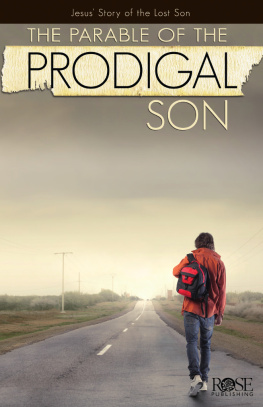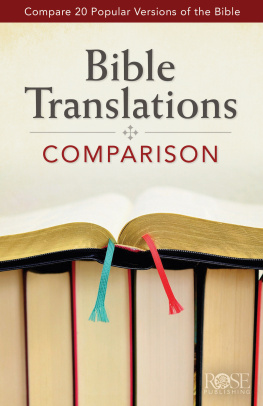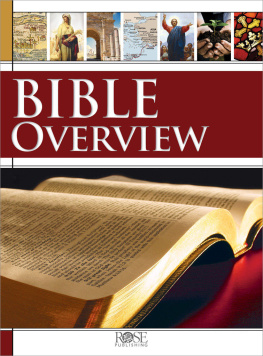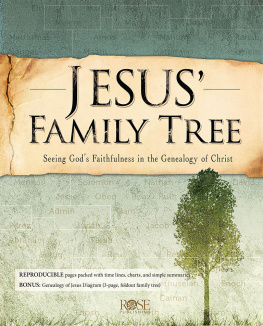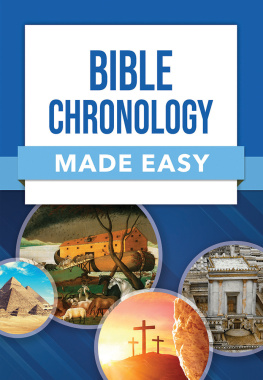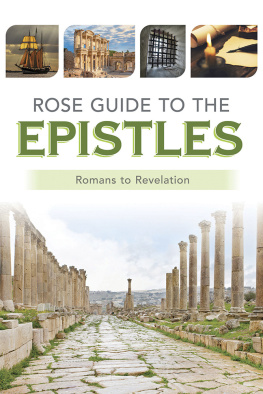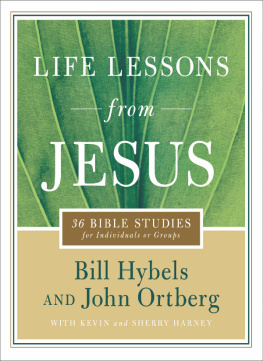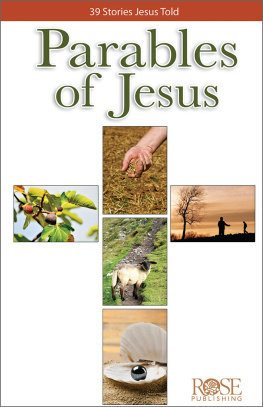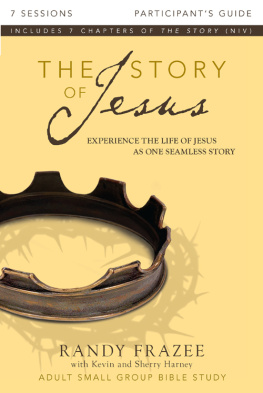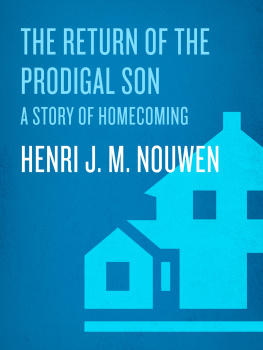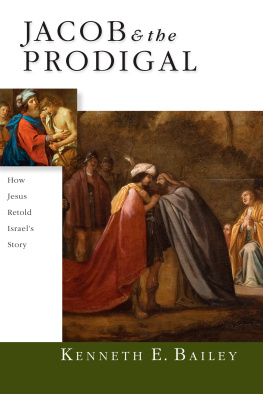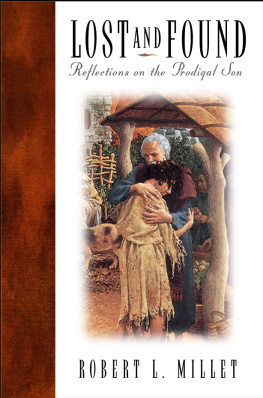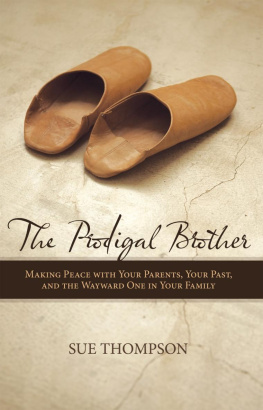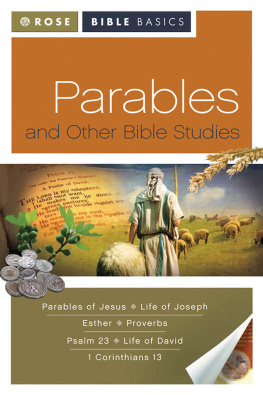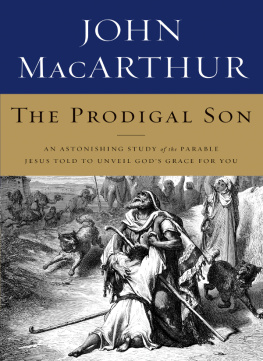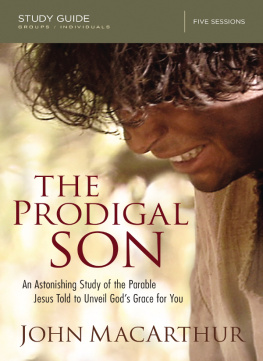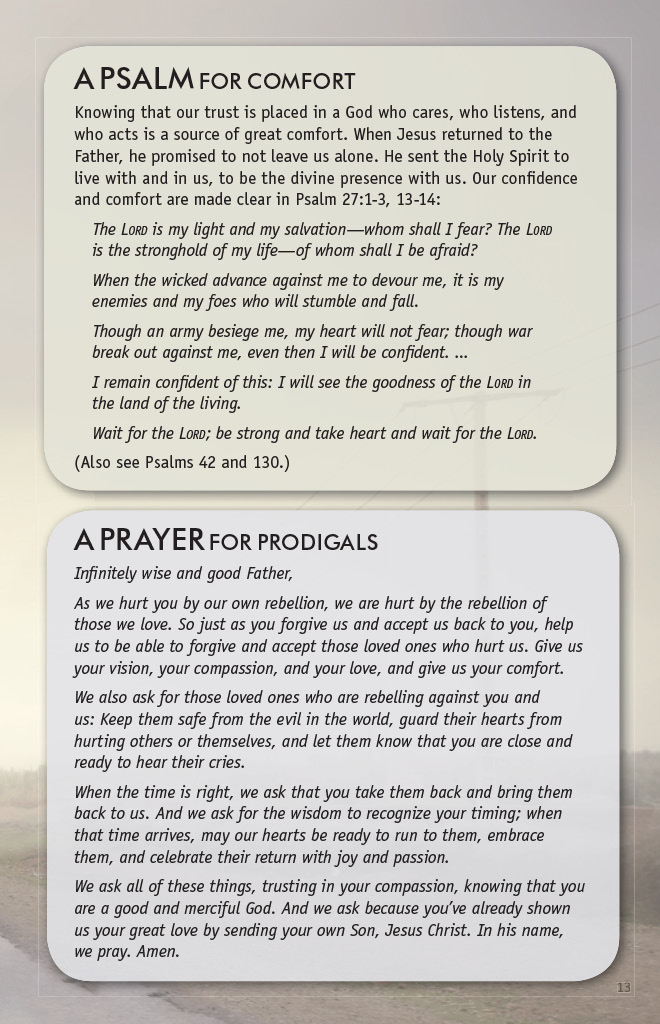The printed version of this eBook is the The Parable of the Prodigal Son pamphlet, ISBN-13: 9781596369610
Author: Benjamin Galan, MTS, ThM, Professor of Old Testament Hebrew and Literature
It is illegal to photocopy, transmit electronically, post on the internet, or reproduce this pamphlet in whole or in part in any form.
All scripture quotations, unless otherwise indicated, are taken from the Holy Bible, New International Version, NIV. Copyright 1973, 1978, 1984, 2011 by Biblica, Inc. Used by permission of Zondervan. All rights reserved worldwide.
2015 Bristol Works, Inc.
Rose Publishing, Inc.
4733 Torrance Blvd., #259
Torrance, California 90503 U.S.A.
Email: info@rose-publishing.com
www.rose-publishing.com
All rights reserved.
Build: 2021-12-03 10:05:46 EPUB 2.0
OUR PRODIGALS
We all have either loved, known, or been a prodigal childsomeone who has rebelled against parents and God and set out on a path of destruction. Whether its fear and worry for a young adult flinging away the faith in which he or she was raised, or the ache of a friends midlife crisis of identity and faith, the prodigals in our lives can bring up some of the deepest questions in our own faith. The parable of the Lost Son (or the Prodigal Son, as it is also known) provides a fresh viewpoint that can help us see those prodigal children from Gods perspective, bringing Gods grace to calm our fears, overcome our anxieties, and soften our hearts for all those prodigals that cross our paths.
THE PARABLE OF THE LOST SON
Chapter 15 of the Gospel of Luke begins with the Pharisees and the teachers of the law leveling a criticism at Jesus: This man welcomes sinners and eats with them (Luke 15:2). Jesus responds to his accusers with three stories:
PARABLE | DESCRIPTION | REFERENCE |
Lost Sheep | A shepherd rejoices over finding his one lost sheep. | Luke 15:17 |
Lost Coin | A woman searches diligently until she finds her one lost coin. | Luke 15:810 |
Lost Son | A rebellious son is lost and then found. | Luke 15:1132 |
In these powerful stories, Jesus calls the Jewish leaders to join him in the joy of finding that which had been lost. Jesus could not be any clearer: I tell you that in the same way there will be more rejoicing in heaven over one sinner who repents than over ninety-nine righteous persons who do not need to repent (Luke 15:7).
Although the Jews at that time expected a Messiah who would save them from the Roman domination, Jesus had come to find the lost, those who needed God at a more basic, intimate level. Those who already had that connection with God should have desired for all others to find that connection. Jesus came to make it possible for all to come to God. This truth should have made the righteous rejoice. Instead, they were judgmental and harsh in their criticisms.
THE FATHER AND THE YOUNGEST SON
In Jesus third story, a father with enough wealth to own land, animals, and servants had two sons. The youngest came to him to request his share of the inheritance: Father, give me my share of the estate (Luke 15:12). It is a short statement that does not seem to say much about their relationship or about either one of them. However, as it was the case with all the parables, Jesus used language and experiences that his listeners could understand. They could hear between the lines and understand the subtle points being made.
In the time of Jesus, a fathers authority was like that of a king. The children were his property, and they depended on him for financial security and social standing. Families lived together and belonged to the fathers household. It was only when the father had blessed his children and then passed away that each son was able to start his own household, with the oldest son becoming the new patriarch of the clan.
In the story, the younger son was, in fact, asking for his independence, for his freedom. The younger son wanted the freedom to make his own decisions, to live his life the way he wanteda desire that opposed the values of the culture at the time. (In Jesus time, connection to and dependence on the family and the father was a far more important value than freedom.) The younger sons demand also meant that the younger son could not wait for his fathers death, when the inheritance would have been divided. In other words, his insistence showed a lack of love for his father.
In making that request, then, the younger son dishonored his father and his fathers household. He forced his father to make a difficult choice. Typically, the society of the time resolved such a problem by banishmentkicking the child out. The younger son deserved to be expelled from his fathers household without inheritance or family.
QUESTIONS FOR REFLECTION:
In our day, the search for independence is highly valued.
How can we continue to search for independence while at the same time remain faithful to and trustful of Gods grace?
GRACE AND REBELLION
The fathers response to the younger son was unexpected: So he [the father] divided his property between them (Luke 15:12). The fathers reaction must have provoked much confusion in Jesus audience. It wasnt the right response. The younger sons insolence should have been met with a strong, negative reaction. But the father gave the younger son what he wanted.
The younger son left his fathers house and, predictably, squandered all he had. As Jesus listeners expected, the sons foolishness led him to a life of misery and humiliation. Eventually, his only option was to take care of pigs. Jews did not eat pork because they considered pigs unclean. For a Jew to be taking care of pigs was the ultimate degradation. The younger son had touched bottom.
But in time, the sons own suffering broke down his pride. In a moment of insight, he became wise: I will set out and go back to my father and say to him: Father, I have sinned against heaven and against you. I am no longer worthy to be called your son; make me like one of your hired servants (Luke 15:1819).
QUESTIONS FOR REFLECTION:
What are some ways to demonstrate true repentance and ask another person for forgiveness?
What does the younger sons behavior teach us about repentance?
AN UNEXPECTED ENCOUNTER
The son headed home, humbled and humiliated, with sorrow and newfound wisdom. Jesus audience, the Pharisees especially, likely imagined that justice was about to be served. The father would surely act with a firm hand over his son.
However, as soon as his father saw him at a distance, the father was filled with compassion for him; he ran to his son, threw his arms around him and kissed him (Luke 15:20). Imagine, a dignified father taking off to meet his rebellious son, the one who had dishonored him and squandered his wealth! In Jesus time, dignified people in Middle Eastern cultures did not run. Running was fit for servants, not for the masters of the home. But compassion moved the father, not justice, not revenge, not pride.
With humility and wisdom, the younger son apologized to the father. However, the father ignored his sons apologyalong with his dirty clothes and body. Instead, he embraced his son and called to his servants to prepare a welcome fit for a most honored guest. Jesus made clear the fathers reasoning for the celebration: For this son of mine was dead and is alive again; he was lost and is found (Luke 15:24).
Next page
